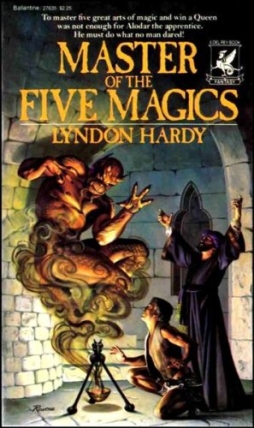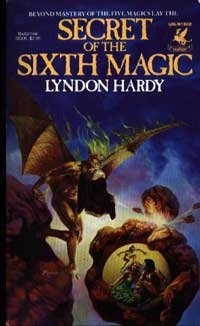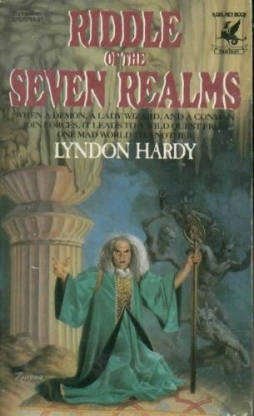80s Fantasy and Master of the Five Magics
 I’ve been thinking lately about fantasy in the 1980s. More specifically, about the wave of fantasy fiction that began to be published in the late 70s, in the wake of The Sword of Shannara and the first Thomas Covenant books, and which over the following years developed into fantasy as we know it now. So far as I can learn, it seems that this was when fantasy really took root as a novel category — that is, when fantasy novels stopped being relatively rare events and began to flourish as a genre. As a result, I think, it was a time when the idea of fantasy broadened; new ideas and forms and voices were tried, even if certain assumptions (like a quasi-medieval-European setting) were often unquestioned. What I wonder is whether certain things tried then and since almost forgotten are in fact worth revisiting.
I’ve been thinking lately about fantasy in the 1980s. More specifically, about the wave of fantasy fiction that began to be published in the late 70s, in the wake of The Sword of Shannara and the first Thomas Covenant books, and which over the following years developed into fantasy as we know it now. So far as I can learn, it seems that this was when fantasy really took root as a novel category — that is, when fantasy novels stopped being relatively rare events and began to flourish as a genre. As a result, I think, it was a time when the idea of fantasy broadened; new ideas and forms and voices were tried, even if certain assumptions (like a quasi-medieval-European setting) were often unquestioned. What I wonder is whether certain things tried then and since almost forgotten are in fact worth revisiting.
It sometimes seems like that generation of books is either ignored, or remembered only for its most popular examples — the big sellers, or the series which started then and are still going. I can’t find much thoughtful criticism of 80s fantasy fiction as a whole, or even much discussion about the relevance of the books of that time to contemporary fantasy writing. This is annoying, as I think it increases the possibility of good work slipping through the cracks. I don’t mean to suggest that there’s a mass of neglected masterpieces, but I do suspect that some of those 80s fantasies have elements to them which might be worth re-examining, or which might speak to contemporary ideas in fantasy.
Take, for example, Lyndon Hardy’s three-book sequence Master of the Five Magics, Secret of the Sixth Magic, and Riddle of the Seven Realms.
Every so often you hear people talk about “hard fantasy” as a counterpart to “hard science fiction.” The Encyclopedia of Fantasy describes it as “stories where magic is regarded as an almost scientific force of nature, and subject to the same rules and principles … By analogy with science fiction, the term hard fantasy might refer to fantasy stories equivalent to the form of hard sf known as the ‘scientific problem’ story, where the hero must logically solve a problematic magical situation.” Hardy’s books are the best examples of hard fantasy I know, defining a system of magic — several systems, in fact — and rigorously working out the ways in which they play off of each other and off of actual physical laws. It’s a fairly unusual approach, and may be worth looking at.
 The three books share a setting, and a character or two, but are not a formal trilogy. Master of the Five Magics (which, like so many fantasy books, inspired a notable heavy metal song) introduces us to a world with, as the title implies, five distinct magic systems. Thaumaturges tinker with physical reality, using sympathetic magic to accomplish great things; they’re bound, though, by the need for some kind of energy source to power their wonders. Alchemists can create all sorts of elixirs and potions, but need to work in bulk, since random factors will cause their formulae to fail a certain percentage of the times they’re tried. Magicians can create powerful items through the use of ritual; the rituals may take considerable time and expense, but once made, a magic item is eternal. Sorcerers are clairvoyants and illusion-crafters, but besides being shunned by most people because of their ability to control the minds of others, they also burn a certain amount of their power every time they use it. Finally, wizards may stare into a flame and summon a demon — but they must mentally wrestle with every demon they summon, and if their willpower is insufficient, they will end up a slave to the creature they called forth.
The three books share a setting, and a character or two, but are not a formal trilogy. Master of the Five Magics (which, like so many fantasy books, inspired a notable heavy metal song) introduces us to a world with, as the title implies, five distinct magic systems. Thaumaturges tinker with physical reality, using sympathetic magic to accomplish great things; they’re bound, though, by the need for some kind of energy source to power their wonders. Alchemists can create all sorts of elixirs and potions, but need to work in bulk, since random factors will cause their formulae to fail a certain percentage of the times they’re tried. Magicians can create powerful items through the use of ritual; the rituals may take considerable time and expense, but once made, a magic item is eternal. Sorcerers are clairvoyants and illusion-crafters, but besides being shunned by most people because of their ability to control the minds of others, they also burn a certain amount of their power every time they use it. Finally, wizards may stare into a flame and summon a demon — but they must mentally wrestle with every demon they summon, and if their willpower is insufficient, they will end up a slave to the creature they called forth.
Alodar, the hero of Master of the Five Magics, begins as an apprentice thaumaturge. He’s ambitious, though; his father was a noble who was stripped of his lands, and he wants to restore his heritage by winning the hand of the beautiful Queen of Procolon, who herself is facing an uprising by possibly demon-possessed lords. The political situation of Procolon becomes a running subplot as Alodar’s quest takes him from the study of one form of magic to another and then another.
It’s a well-plotted book, inventive and unpredictable, and builds nicely to a large-scale conclusion. The writing style’s a bit stilted, but occasionally reaches a baroque inventiveness of diction that recalls Jack Vance. Characterisation’s minimal; you could say the book makes effective use of archetypes. What makes it stand out is the thought put into the magic systems, and how they interact. Alodar uses one form of magic to help him uncover the secrets of the next, and the tricks he thinks up to help him develop his mastery of the different crafts are consistently clever, illustrating the different habits of thought required for the different magic forms.
The setting, though, seems underdeveloped. Procolon’s a generic medieval European setting, with magic on top. The integration of magic into society seems inconsistent; I think the book’s most effective when Hardy examines a specific magical community, as in an extended sequence set entirely inside a magician’s guild. At worst, the society seems vestigial, something that exists only to give the magic systems some kind of background.
 Secret of the Sixth Magic goes some way to try to deal with how magic affects the broader world. We see sorcerers casting illusions as a spectacle; magicians who’ve developed a magic currency and banking system; thaumaturges working to create an extra harvest. The problem is that the more of this sort of thing we see, the more we think that the shape of society ought to be different.
Secret of the Sixth Magic goes some way to try to deal with how magic affects the broader world. We see sorcerers casting illusions as a spectacle; magicians who’ve developed a magic currency and banking system; thaumaturges working to create an extra harvest. The problem is that the more of this sort of thing we see, the more we think that the shape of society ought to be different.
The story of Secret of the Sixth Magic is in some ways the inverse of the first book. It follows Jemidon, who desperately wants to become a master of some form of magic but has shown no aptitude for any of the crafts he’s tried. The book opens with him becoming apprentice to a sorcerer — but something else is happening at the same time, something which seems to be calling into question the very existence of all the five magics. And in fact as the book goes on, Jemidon discovers a previously-unsuspected sixth magic form, a metamagic which determines how the other five forms work.
It’s an intelligent extrapolation from the magic system of the first book, but is I think less successful as a novel. The vocabulary seems toned down, so that the stiffness remains but not the sense of Vancean whimsy. The story’s slow to get underway, and never really seems to develop the momentum of the first book. Dialogue seems even more filled with exposition, and characters generally behave in curious ways. Jemidon himself is a less involving protagonist than Alodar. The contrast is direct: Alodar moved from mastery to mastery, Jemidon’s a failure at all the magics he attempts. That could have made Jemidon a more interesting character, but he doesn’t seem different enough from Alodar for the contrast to be credible. We’re told explicitly how he’s different from Alodar, how he doesn’t think through the practicalities of things, but it’s not really convincing.
 Riddle of the Seven Realms, by contrast, is an interesting mixed bag. The characters are more vivid, and more varied, but the plot is much looser. The book follows a demon, Astron, who must undertake a quest in the world of men. He falls in with a wizard trying to prove her worth and a con man with an axe to grind against all magicians, and they set out on a journey that takes them across a variety of different dimensions.
Riddle of the Seven Realms, by contrast, is an interesting mixed bag. The characters are more vivid, and more varied, but the plot is much looser. The book follows a demon, Astron, who must undertake a quest in the world of men. He falls in with a wizard trying to prove her worth and a con man with an axe to grind against all magicians, and they set out on a journey that takes them across a variety of different dimensions.
They find the item they seek about halfway through the book; the rest of the story finds them struggling to move from one world to another, dealing with the odd rules by which the different dimensions work. It’s largely an opportunity for character development, but it feels excessive, inessential. The different realms they encounter seem like thought-exercises; and to an extent they are, being creations of characters within the book. Still, it’s difficult to care about them, even if they serve to give Hardy a chance to develop yet more magic systems.
Probably the best thing in the book is its treatment of the world of demons, and the way their world works. Hardy’s thought through what demons are and how they operate, and created a fascinating society with its own mores and laws. It’s real speculative fiction; an utterly alien society that still seems in some way to speak to the real world.
Hardy doesn’t seem to have published any other fiction than these three books (which came out in 1982, 84, and 88). That’s too bad. There’s an intellectual rigor to them that’s an interesting take on fantasy; in some ways it’s much more like science fiction. At their best, they show what hard fantasy can be, using focused logic not only to develop a system of magic, but by extension to build a world and illuminate character.
They’re puzzle-books, in a sense. In different ways they each incorporate puzzles into their basic structure — not riddles, but puzzles, the literary equivalent of Rubik’s Cubes (to evoke a very 80s image). It’s an unusual approach to fantasy, and worth looking at.
I think it’s fair to say that these books were of their time. But what does that mean? It seems to me that fantasy in the 80s was something that was in the process of developing, of finding out what it could be. I think that the result was a lot of flawed but interesting work. I think that the givens were different then than they are now, and I suspect that it’s worth re-examining some of those books now to see what we can get from them today. Hardy’s books are a good example; there’s not much else like them. They’re worth remembering.
Matthew David Surridge is the author of “The Word of Azrael,” from Black Gate 14. His blog is Hochelaga Depicta.
Back in the day, I loved Master of the Five Magics and read it several times during my teen years. The second novel… not so much. I never heard of the third book until today 🙂
Ah, well I enjoyed Master of the Five Magics and Secret of the Sixth Magic…I think I liked 6 better than 5, but it’s been a long while since I read them, though they are here on the shelves next to me. And right beside them though yet unread is Riddle of the Seven Realms. Guess I should remedy that.
For what it’s worth, when I went to reread the first two books to write this post, both of them for the first time in at least 20 years, I found myself hazily remembering a lot of scenes and cool moments — all of them from the first book. I don’t know why I didn’t read the third book back when it came out, but it seems to me to be better than the second, if often drier.
My question for both of you guys (and others) … what other books from the 80s do you have fond memories of? As I say in the post, I’ve really begun to wonder whether there wasn’t more going on in fantasy fiction back then than it sometimes gets credit for. I’m thinking I might want to expand on this at some point in the future …
A book that came to mind immediately was Barry Hughart’s Bridge of Birds. Exciting, funny and often brilliant…
…I think. It’s been a very long time.
No, I’d say that’s quite right. I read the book (and its sequel) not long ago, and thought they were great. They’re exactly the sort of thing I’m thinking of, actually; the way they try to engage with another culture seems like something a lot of writers today are concerned with. Only they were written more than twenty years ago.
Let’s not forget Elizabeth Moon’s Sheepfarmer’s Daughter, which began the Paksennarion trilogy. Most of Moon’s work came out in the nineties, but that first offering was absolutely eighties. Nineteen eighty-eight, I believe. Her treatment of gnomes, with their incredibly rigorous attention to law and deal-making, was in and of itself fascinating.
[…] kind of scheme — only to find it’s not that easy to turn away from magic afterward. Alodar from Master of the Five Magics is an example; so’s Skeeve from the Myth books. Many of these wizards are close to being frauds; […]
[…] I’ve mentioned a few times before that I have a fascination with 80s fantasy, and suspect a number of now-overlooked genre books from those years are worth closer examination. I want to put forward another example of what I mean: The Interior Life, written by Dorothy Heydt under the name Katherine Blake. Published in 1990, it’s a novel that does interesting things in mixing a fantasy world with the experiences of a modern-day housewife. […]
[…] I’ve written here before about my fascination with underexplored elements in 80s fantasy. In this context I have an elastic definition for ‘80s,’ beginning in 1977 — arguably when the modern mass-market fantasy genre was born, with the publication of Brooks’ Sword of Shannara and Donaldson’s Illearth War — and ending whenever seems rhetorically convenient (I go back and forth, and any ideas in comments about when 80s fantasy ended will be read with interest). Particularly earlier on, there’s an odd mix in these years of idiosyncratic, individual tales alongside a developing commercial genre; in all, a lot of stories trying out techniques and approaches, a lot of writers finding out what works and what doesn’t. We remember, on the whole and more or less, the stuff that works. But sometimes it’s interesting to see the stuff that misfires, and see other possibilities for the genre. […]
[…] written a few times about my ongoing fascination with fantasy from the 1980s. That fascination led me to […]